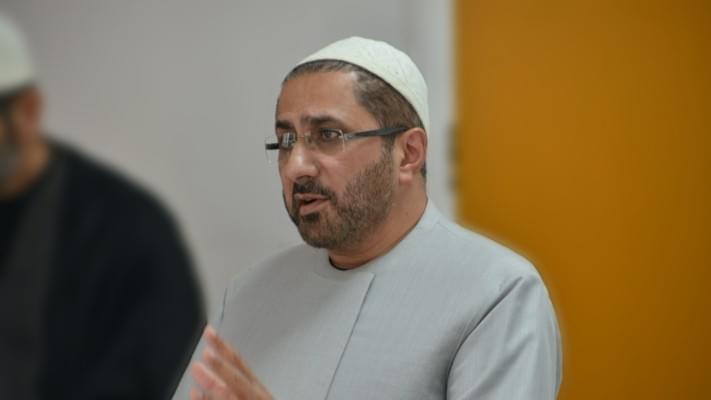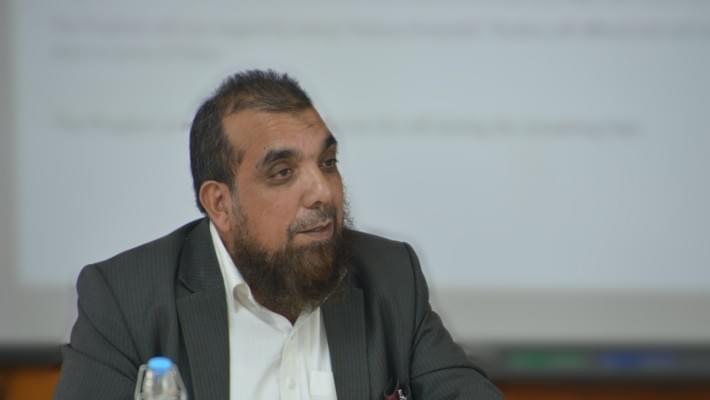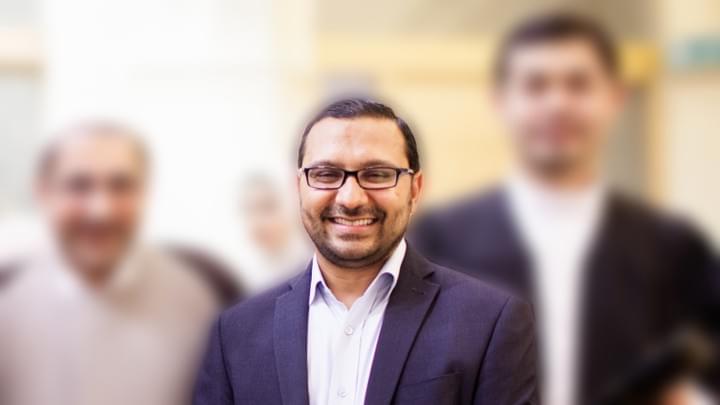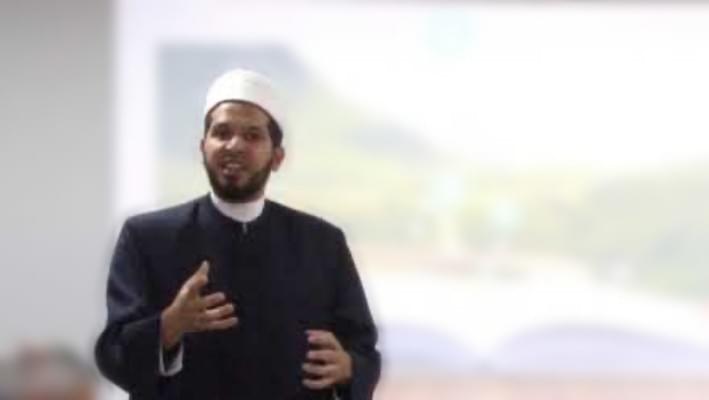
unified guidance for all muslims
Working together to tackle pressing issues in the modern world
Our vision
Scholars at the Centre for Decrees and Doctrines (Dār al-Iftāʾ wal ʿAqāʾid) believe that irrespective of the variations in thought between Muslims, it is important to work together to tackle pressing problems facing the Muslim community by issuing unified decrees (fatāwah) as guidance.

Collaboration and Concurrence
Bringing Together a Divided People
The Centre for Islamic Decrees and Doctrines (Dār al-iftāʾ wa-l aqāʿid) brings together scholars, from a cross-section of Islamic schools of thought, to provide unified guidance for the diverse Muslim population living in the West. The formation of different denominations, or schools of thought, with their own analytic and interpretive methods, is a natural feature in the development of any religion. The Centre for Decrees and Doctrines believes that, irrespective of these variations, scholars belonging to different Islamic denominations can work together to provide Sharia based answers to pressing problems that are faced by Muslims residing in the West.

Relevance
Solving Social Challenges
Scholars are encouraged to discuss sensitive theological and jurisprudential issues that arise due to modern-day social, technological and scientific advancements in areas such as healthcare, geo-politics, and finance. Living in a multicultural context, Muslims are faced with theological questions that concern matters of religious beliefs (aqāʿid), such as, “Can non-Muslims attain salvation?” They are also faced with jurisprudential questions, which can broadly be categorised into two types of Sharia regulations:
1) Matters of devotional rituals (ʿibādāt), such as, “Is it permissible to fast in Ramadan when doctors advise not to?”
2) Matters of social interaction (muʿāmalāt), such as, “Can Muslims invest in banks that pay interest?” Or, “Is it permissible to donate organs?”

Qualified Research
Sharia Regulation
The Centre for Decrees and Doctrines upholds that acting in accordance with the dictates of Sharia leads mankind towards perfection. Accordingly, the most appropriate answers to modern day issues are those that can be rooted within the folds of Sharia. Whilst all Muslims may concur on this, the question remains, how do we determine what the dictates of Sharia are? In response to this, Muslims have historically formed several schools of jurisprudence (also known as madhāib, sing. madhab) among which the major five that are named after their eponymous founders, including Shāfiʿī, Mālikī, Ḥanafī, Ḥanbalī, and Jaʿfarī have survived. Each school of jurisprudence has a legal methodology (uṣūl al-fiqh) which deals with the sources that can be used to derive Sharia regulations. Based on their subtle theological persuasions, some schools only give preference to textual sources of the Quran and Sunna, whilst other schools also refer to non-textual sources such as human reason (ʿaql), analogical reasoning (qiyās), social interest (maṣlaḥa), juristic preference (istiḥsān) etc.

Decrees and Doctrines
Drawing Conclusions
Given the diversity within the legal methodologies of different schools of jurisprudence, the Centre for Decrees and Doctrines brings together scholars who are affiliated to one of the five major schools and are well versed with their school’s legal methodology. Based on the questions that arise within their respective communities, scholars decide what issues they want to collectively focus and deliberate on. Each scholar individually researches the issues within the bounds of their school’s legal methodology. Scholars then convene, once a quarter, at the centre to collectively discuss their research findings. After sharing their respective research and opinions, scholars endeavour to arrive at a unanimous opinion that they can all collectively agree upon. This is usually based on what can be established as the minimum requirements of the Sharia. If a unanimous opinion is achieved, the Centre for Decrees and Doctrines propose it as a decree (fatwā) or a doctrine (ʿaqīda).
The Time of Maghrib in Islamic Law
How do you determine the correct time of Maghrib?
The Growth of the Halal Meat Industry in the UK and Halal Slaughter Practices
Educational Workshop on Monday 9th September 2024
Qur’an and Ritual Purity
Can you recite the Qur’an during menstruation?
Determining the first of the month
How do you determine the first date of the new month?
TOUCHING A DIGITAL QUR'AN
Can you touch a digital Qur'an without ablution (wuḍūʾ)?
Polygyny in Islam
Should a man marry more than one wife in the Western context?
Halal compliance in Stunning and Slaughter of Ovine (Sheep/Lamb)
Is It permitted by the Sharia to stun ovine before ritual slaughter?
Tattoos in Islam
Are Muslims Permitted to Apply Tattoos?
Keeping a beard
Is it Obligatory in Islam for a Muslim to Keep a Beard?
HOARDING
Is it permissible to hoard in Islam?
Music and Singing in Islam
Is Music and Singing Permitted in Islam?
THE NATURE OF ABROGATION IN THE QURAN
Is the Quran Self-Contradictory?
The islamic guidance on visiting graves
Is it permissible to visit graves and to kiss and touch tombs in Sharia?
Artificially Assisted Reproduction And Sperm Donation
Can an infertile couple use a sperm donor?
Cannabis
Is smoking/consuming cannabis permissible?
Non-Muslims and mosques
Are non-Muslims allowed to enter the mosque?
Sex reassignment surgery
Does Islam permit sex-reassignment surgery due to gender ambiguity?
animal rights
What are the rights of animals in Islam
Solitary Reports and Details of the Articles of Faith
Can matters related to the necessary articles of faith (uṣul al-dīn) be derived from solitary (or non-mutawātir) narrations?
Islam and Previous Scriptures
What is the Islamic Attitude Towards Previous Divine Scriptures?
Subscribe
We'll share new rulings as they are published.
Meet THE SCHOLARS
Given the diversity within the legal methodologies of different schools of jurisprudence, the Centre for Decrees and Doctrines brings together scholars who are affiliated to one of the five major schools and are well versed with their school’s legal methodology.

Mufti Mohammad Farooq Alvi
Imam of Jamia Mosque, Birmingham
Mufti Mohammad Farooq Alvi pursued traditional seminarian studies for 14 years in Pakistan, studying subjects including Quran, fiqh and tafsir under notable teachers such as Mufti Muhammad Shafi, Qadhi Shamsuddin and Maulana Ghulamullah Khan. He was awarded anʾijāza (highest level of qualification) which certifies his proficiency in hadith, tafsir, and issuing religious edicts from Wafaq ul Madaris Al-Arabia, which is the largest federation of Islamic Seminaries around the Pakistan. Upon completion of his seminarian education he attained a bachelor’s degree in Politics and a master’s degree in Islamic Studies.
For over 30 years, Mufti Farooq served as an imam in Pakistan whilst simultaneously teaching Arabic, fiqh, hadith and tafsir in various madrassas. Since his arrival in the UK, he served as an imam and religious speaker of the Central Mosque of Dundee, Scotland, before moving to his current position at Jamia Masjid, Birmingham in 2004. He previously served as the Director of the British Sharia Council and has published numerous papers in Arabic and Urdu on topics including contemporary juristic issues.

Shaykh Arif Abdulhussein
Director of Al Mahdi Institute, Birmingham
Shaykh Arif Abdul Hussain founded Al Mahdi Institute in 1993, and currently serves as its Director and senior lecturer in Shi’i legal theory and Muslim philosophy. For over twenty years, he has been at the forefront of developing and delivering advanced Islamic studies, tailored towards equipping students with the skills to contribute meaningfully at both an academic and grass-roots level. He is continually publishing works in English aimed at addressing the challenges faced by Muslims living in contemporary society.
Shaykh Arif was educated at the Madrassah Syed al-Khoei, London, where he also taught grammar, logic, Islamic jurisprudence and legal theory. He continued his seminarian post-graduate studies in Qom, Iran and attended private training and research lessons. Alongside his studies, he also taught in Qom across a wide spectrum of the traditional Muslim scholarly disciplines. After returning to the UK, he was taught by Ayatollah H. Amini, who was a student of Ayatollah Khoei.

Dr Mohammad Khalid
Director of The Centre for Islamic Studies (CIMS), Birmingham
Dr Mohammad Khalid completed his traditional Islamic education in Pakistan, studying under grand scholars including Mufti Sayyid Sayyahud Deen and Shaikh Abdul Malik. He received a master’s in Islamic Studies from Markez-e-Uloom Islamiyah, and a bachelor’s in Islamic Studies from Idara Ishaatul Uloom, where he also memorised the Holy Quran. Upon arriving in the UK, he continued his studies at the University of Birmingham and the University of Aberdeen where he obtained an MPhil and PhD. For over twenty-years Dr Khalid has been a Minister of Religion and has been a visiting lecturer in both Islamic and secular educational establishments at the University of Birmingham. He has also taught ulum al-Quran, ulum al-hadith and Islamic history as part of the four-year Hawza programme at Al Mahdi Institute, in addition to teaching fiqh, usul al-fiqh and Arabic Grammar in Dar al -Uloom, Birmingham.
He currently serves as the Director of The Centre for Islamic Studies (CIMS), a grass roots initiative which brings scholars from across different schools of thought, to discuss topical issues in order to promote understanding.

Dr Kumail Rajani
Postdoctoral Research Fellow, University of Exeter
Dr Kumail Rajani is a Postdoctoral Research Fellow in Islamic Studies at the Institute of Arab and Islamic Studies, University of Exeter, where he completed his doctoral thesis. He is currently working on the Law, Authority and Learning in Shiite Islam project (http://www.lawalisi.eu/) with Professor Robert Gleave; the 5-year project, funded by the European Research Council, examines the emergence, development and operation of the Shiite legal system. Though primarily focused on the origins and development of Shiʿi hadith, his research includes Qurʾanic exegesis, Islamic law and legal theory, Ismaili studies, and Shiʿi studies more broadly. He has published both in Persian and English. His entry on ‘Hadith: Shiʿi’ is published in the online Oxford Bibliography of Islamic Studies and he has two forthcoming articles on Shiʿi hadith criticism and ʿilm al-rijāl which he co-authored for The Oxford Handbook of Ḥadīṭh Studies. He is also the founder of Shiʿi Dates Project (www.shiidates.net).
Dr Kumail Rajani has undertaken seminary studies in Qum for over 17 years during which he attended the lectures of Ayatullah Sayyid Ahmad Madadi al-Musawi for 7 years and Ayatullah Shubayri Zanjani and Ayatullah Wahid Khurasani for 3 years. Whilst in Iran, he taught modules on hadith studies, comparative religion, history, Islamic law and legal theory at the Al-Mustafa International University and other educational and research institutions. Alongside teaching, he supervised and advised on several BA and MA dissertations in English, Persian and Urdu. He has also taught Islamic Law and Society at the University of Exeter, and Islamic History at Al-Mahdi Institute.

Shaykh Umar Ramadhan
Head of Ramadhan Foundation
Shaykh Muhammad Umar is the Chairman of Ramadhan Foundation, a leading Muslim organisation in the UK working for peaceful co-existence and dialogue for all communities. He is also a senior member of Majlis al-Shura, (consultative council) of Markazi Jamat E Ahle Sunnat (Central Association of Sunni Muslims UK & Overseas) which is the oldest and largest body representing Sunni Muslims in the UK.
He studied and gained the ijaza (highest level of qualification) from grand scholars including Sayyed al Hafidh Hasan ben as Siddiq al Ghumari al Hasani, Morocco, Allama Sayyed Dr Abdul Qadir Jillani, Pakistan, and Shaykh Dr Mahmood Said Mamdhu, Egypt. Shaykh Umar’s lectures and media appearances are focused on imparting Islamic knowledge to both Muslims and non-Muslims alike. He has delivered lectures throughout the world on a variety of topics including the Muslim role in the west, interfaith and peaceful co-existence.

Shaykh Abdul Hadi Al-Umri
Head of Jamiat e Ahle Hadith, UK
Shaykh Abdul Hadi al-Umri studied under renowned scholars whilst pursuing traditional seminarian studies (Dars-e-Nizami) in India and at the Islamic University of Medina, Saudi Arabia. He specialised in hadith studies and went on to teach hadith and wider Islamic studies in Saudi Arabia, India and the UK. Aside from lecturing in various universities he regularly lectures on international TV channels addressing contemporary issues facing Muslims. Shaykh Umri has published papers on fiqh in English, Urdu, and Arabic and is an editor of the Sirat-e-Mustaqeem journal. He was also a member of the Islamic Shariah Council.

Shaykh Ayman Yacoubi
Lecturer at the University of Birmingham
Shaykh Ayman Yacoubi graduated in the field of languages from the world-famous Al Azhar university where he also studied the traditional Islamic sciences. Following this, he completed two master’s degrees in linguistics; first from Marlboro graduate college in the USA and secondly from the University of Birmingham. He also studied teaching and education at the University of Cambridge. Shaykh Yacoubi has taught Arabic at the European Institute of Human sciences and he is currently the teacher of Quran, fiqh and Arabic language at the Bab ul Ilm alim programme in addition to teaching in the Languages programme at the University of Birmingham.
get in touch












